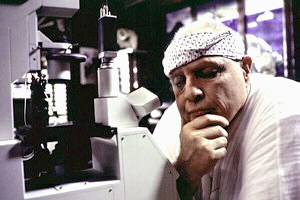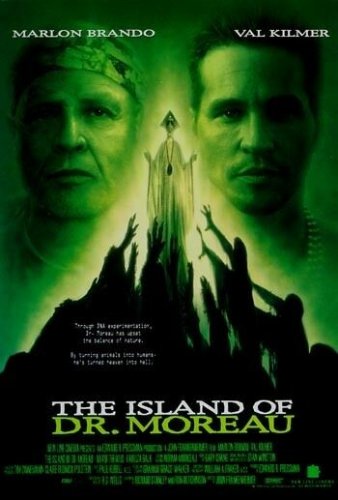Plot Summary & Background
Surviving a plane crash in the South Pacific, an ambassador for the United Nations is picked up by a ship, the Ombak Penari, filled with exotic animals and a group of assistants to Dr. Moreau, and taken to a remote island. Shrouded in mystery, Douglas soon becomes aware of the ethical dilemmas taking place on this island, as Dr. Moreau is fusing animals with human genes. As the beasts became aware of their condition, they rebel against their "Father," and the creator of these "experiments" is killed in turn. The protagonist is left to the mercy of the beasts and the terror of his own memories.
For more on the film, please visit the following link: IMDB
Critical Analysis: Beast vs. Humanity, by Todd J. Schmid
In the opening sequence of The Island of Doctor Moreau, a series of cells and genetic images taken at the microscopic level flash before the viewer, clearly foreshadowing the significance and consequences of the scientist's use of genetic manipulation. There are also shots of wide open eyes staring into the camera. The "humanity" of these eyes, contrasted with the cold shots of genetic science, sum up the bioethical dilemma in the film and display a complex history of humanity and science.
The graphic imagery of the beasts, with various levels of human characteristics, on Moreau's island forces the audience to grapple with these essential questions: What does it truly mean to be human? Can we or anything else be "part" human? How does evolution shape our understanding of humanity? In one scene of the film where a group of beasts enter Moreau's home to confront him about the "law," the Hyena-Swine asks Moreau, "Father, what am I?...Tell me why you make the pain if we are your children...If there's no more pain, then is there no more law?" The beasts, in understanding the concepts of pain and law, ultimately reject their humanity. This rejection of their "human" state perhaps reflects the inability of humans to alter the state of the natural order.
Moreover, the ambiguity between beast and humanity is one of the key issues of the film adaptation of Doctor Moreau. The climax of this scene occurs when Douglas tells one of the beasts that he is a god. The camera zooms in on the face-off between a beast and a man. Here the audience can truly take in the similarity or difference between humanity and the rest of the animal kingdom. One of the great connectors in the film is Aissa, the supposed daughter of Dr. Moreau who does not appear in Wells' original. Nonetheless, "part human, part cat," this character, among all the "beasts," relates most intimately with the audience. Acting almost as a "missing link" between beast and humanity, the audience is forced to decide for themselves their own views on what it means to be human.
Indeed, various Biblical references throughout the film distinguish it from the novel counterpart. The direct exchange of references between Douglas and Dr. Moreau symbolizes the opposing bioethical ideologies. "Please tell them that I am God." As Roger Bowen points out, "On Moreau's island beasts are translated, or partiallly so, to a higher level of creation by the deific Moreau, as man was created by God" (Studies, 321). He later adds: "Two facts remain: Moreau perishes, his experimentation having proved a failure, and he lies on the pyre white and awful like some fallen titan; and Prendick survives, but lives thereafter in solitude, a lost and crippled soul" (Studies, 330). Perhaps the film's conclusion proposes the ultimate philosophical result of an evolutionary worldview, a loss of purpose, lost in solitude in the course of evolutionary progress.
The closing sequence of the film reflects the thoughts of the protagonist as he sails from the island. "At those times I like about me at my fellow man, and I'm reminded of some likeness to the beast people. And I feel as though the animal is surging up in them, and they're neither wholly animal nor wholly man, but an unstable combination of both, as unstable anything Moreau created. And I go in fear." Flashing documentary images of humanity's violent tendencies, Moreau is comparable to films like Walkabout (1971), questioning how far humanity has really come. Are we all the same? Are we really, as the protagonist thinks, an unstable combination of "civilization" and "beast"?

